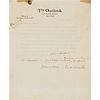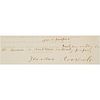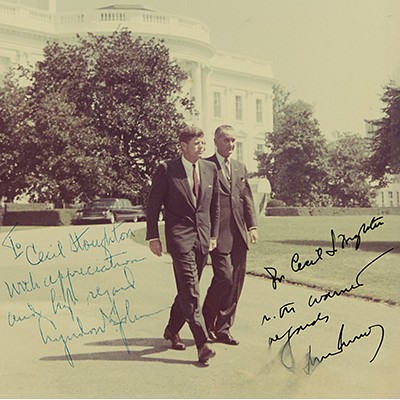Theodore Roosevelt Typed Letter Signed on Jewish Equality
Two ways to bid:
- Leave a max absentee bid and the platform will bid on your behalf up to your maximum bid during the live auction.
- Bid live during the auction and your bids will be submitted real-time to the auctioneer.
Bid Increments
| Price | Bid Increment |
|---|---|
| $0 | $5 |
| $50 | $10 |
| $200 | $25 |
| $500 | $50 |
About Auction
May 10, 2023
RR Auction support@rrauction.com
- Lot Description
TLS signed “Theodore Roosevelt,” one page, 7.5 x 9.25, The Outlook letterhead, June 30, 1911. Letter to Israel Fischer, marked "Private," commenting on the question of indicating race or religion on passports. In full: "This is strictly private and for your own consideration only, because I must not be quoted in any way that would seem to criticize anyone connected with the administration of my successor in office. Personally I would not put in the word Hebrew. I believe that from the standpoint of the Christian, just as much as from the standpoint of the Jew, it is ill-advised to treat what is really a religious matter as a race matter. I know plenty of men, some of them very prominent men, who are of mixed race; and personally I should no more have a man entered on a passport as a Hebrew, than as an Episcopalian, or a Baptist, or a Roman Catholic." At the end, he writes in his own hand: "Such an entry in the census is doubtless entirely proper." Roosevelt also makes a handwritten correction to the previous line of text. Handsomely mounted, cloth-matted, and framed with a portrait to an overall size of 19 x 16. Professionally cleaned, flattened, and restored to near-fine condition, with stains along the top edge and light toning from prior display.
The recipient, Israel Fischer, was a prominent Jewish attorney and politician from New York, who had been a member of the executive committee of the New York Republican State Committee, a US Congressman, and a member of the Board of General Appraisers, as appointed by Roosevelt's predecessor, President William McKinley.
This letter concerns 'the passport question,' a controversy that erupted in 1911 when the American Jewish Committee launched a campaign against a Russian policy of denying visas to U.S. passport-holders of Jewish faith. Historically, the US passport had no category for race or religion. There were, however, places for physical description—including complexion—so, in effect, race could be determined by looking at a passport. It may have been suggested within the Taft administration that "Hebrew" be added to the passports of Jews, making it apparent at a glance whether or not the traveler was Jewish.
Roosevelt takes a stand against this idea, arguing in favor of equality amongst Americans of all races and religions. He had developed a special relationship with the American Jewry during his time as police commissioner of New York City, admiring them for their dedicated efforts to keep the city safe. In 1899, Roosevelt’s support was so high amongst Jewish Republicans that they printed Yiddish flyers for his gubernatorial campaign alluding to his and the Rough Riders' victory in the Spanish-American War as revenge for the 1492 expulsion of Jews from Spain. As president, Roosevelt would become the first to appoint a Jewish cabinet secretary: Oscar Straus as Secretary of Commerce and Labor.
A significant letter by Theodore Roosevelt, demonstrating his steadfast commitment to the equality of all men during a time of worldwide prejudice. - Shipping Info
-
Bidder is liable for shipping and handling and providing accurate information as to shipping or delivery locations and arranging for such. RR Auction is unable to combine purchases from other auctions or affiliates into one package for shipping purposes. Lots won will be shipped in a commercially reasonable time after payment in good funds for the merchandise and the shipping fees are received or credit extended, except when third-party shipment occurs. Bidder agrees that service and handling charges related to shipping items which are not pre-paid may be charged to a credit card on file with RR Auction. Successful international Bidders shall provide written shipping instructions, including specified Customs declarations, to RR Auction for any lots to be delivered outside of the United States. NOTE: Declaration value shall be the item’(s) hammer price and RR Auction shall use the correct harmonized code for the lot. Domestic Bidders on lots designated for third-party shipment must designate the common carrier, accept risk of loss, and prepay shipping costs.
-
- Buyer's Premium



 EUR
EUR CAD
CAD AUD
AUD GBP
GBP MXN
MXN HKD
HKD CNY
CNY MYR
MYR SEK
SEK SGD
SGD CHF
CHF THB
THB













